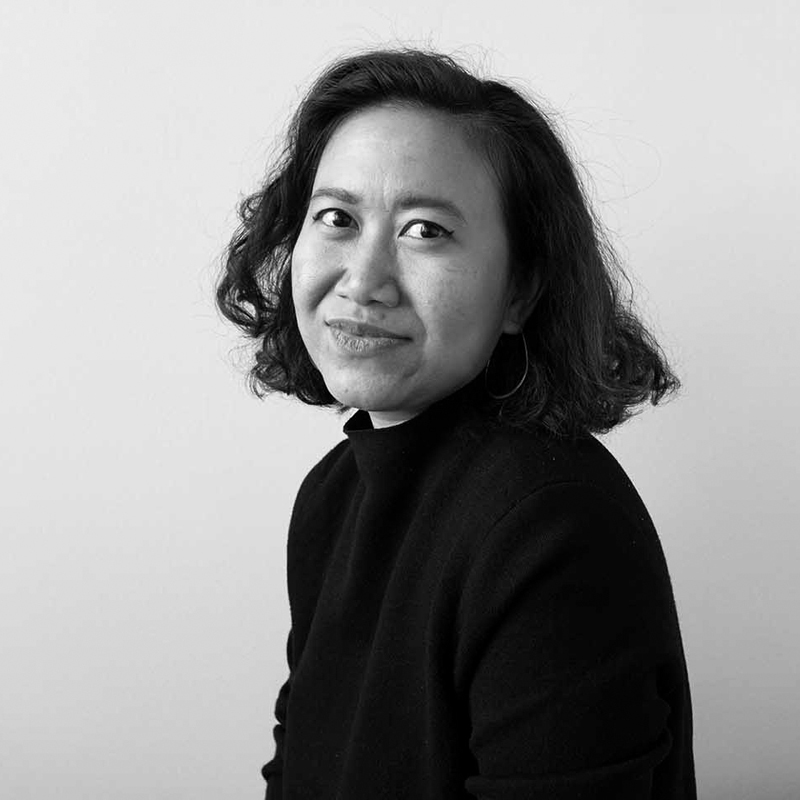
Focusing her attention on issues of food politics, Elia Nurvista (born in Yogyakarta, 1983) uses various media and interdisciplinary approaches to examine power, social and economic disparities in the world through food. Elia often uses several media, including workshops, study groups, publications, site-specific art, performances, videos and art installations to explore the social implications of food systems as well as discuss broader issues, such as ecology, gender, class and geopolitics.
In 2015, she initiated a food study group called Bakudapan with her friends and colleagues. Together with this group, she conducted research on food in social, political and cultural contexts. She is also part of Struggles for Sovereignty, a solidarity platform regarding land, water, agriculture and food between groups in Indonesia and transnationally involved in the struggle for the right to self-determination over basic resources.
Elia has been involved in several curatorial projects, such as Jogja Biennale Equator VI; Indonesia with Oceania (2021) and ADAM LAB with Transient Collective, Taipei Performing Arts Center, (2020). Meanwhile, she has also participated in several exhibitions, including 15th Sharjah Biennial, Sharjah (2023), Dhaka Art Summit, Dhaka (2020), Karachi Biennale, Karachi (2019) and 9th Asia Pacific Triennial of Contemporary Art, QAGOMA, Brisbane (2018). She was nominated for a Visible Award in 2017 for her social practices and received the position of Artistic Chair from the Nantes Institute for Advanced study, France and to work as a fellowship researcher in 2023. She currently lives and works in Yogyakarta and Berlin.
Elia's digital prints focus on actual issues regarding the palm oil industry. On the one hand, palm oil is an export commodity that has a very high value for its exporting countries. Indonesia is the world's largest producer of palm oil and vegetable oil. Many economic sectors in the world depend on the supply chain of palm supply (hidden palm oil), both food and non-food products such as biofuel, cosmetics and toiletries. Biofuel is a fuel produced from organic materials, including products that exploit the least natural resources.
The opening of new lands related to industrial needs has had an impact on social and ecological destruction such as land conflicts, deforestation and the struggle of indigenous communities whose land has been evicted. Now hundreds of millions of people around the world continue to participate in the palm oil industry every day: migrant workers, company executives, shareholders, global consumers to local workers and farmers. Elia has been exploring this "post-plantation" issue for several years and joined the Struggles for Sovereignity (SFS) platform which brings together various communities in the fields of art, food, agriculture, land rights, indigenous activism and ecology. Her field research on this issue began in 2019. The issue of oil palm plantations continues to be in a tug-of-war between ecological sustainability which still has social value and exploitation of workers and natural resources.
Elia's digital print works, a part of her artistic research entitled Long Hanging Fruits, produces a number of panoramas that depict the complexity behind the economics and politics of oil palm. She uses these commodities as a lens to see the complexity of today's world of hyper-capitalism. Starting from its lineage in colonial history to our lives and bodies that are entangled with this material through daily consumption and the people who make sacrifices to drive this industry. Elia combines photos, personal data, internet sources and images processed by A.I. machines. to produce this series of works. The technology and data used in algorithms are not completely free from issues of inequality in race, gender and class.